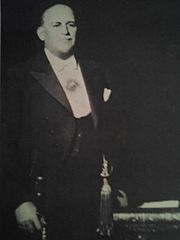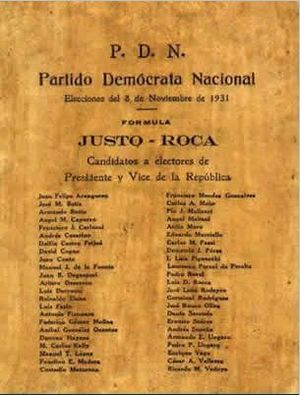Agustín Pedro Justo facts for kids
Quick facts for kids
Agustín P. Justo
|
|
|---|---|

President Agustín P. Justo
|
|
| 23rd President of Argentina | |
| In office February 20, 1932 – February 19, 1938 |
|
| Vice President | Julio A. Roca Jr. |
| Preceded by | José Félix Uriburu |
| Succeeded by | Roberto M. Ortiz |
| Minister of War of Argentina | |
| In office 12 October 1922 – 12 October 1928 |
|
| President | Marcelo Torcuato de Alvear |
| Preceded by | Julio Moreno |
| Succeeded by | Luis Dellepiane |
| Personal details | |
| Born | February 26, 1876 Concepción del Uruguay, Entre Ríos |
| Died | January 11, 1943 (aged 66) Buenos Aires, Argentina |
| Nationality | Argentine |
| Political party | Concordancia (UCR-A, PSI, PDN) |
| Profession | Military |
| Signature | |
| Military service | |
| Branch/service | Argentine Army |
| Years of service | 1892–1931 |
| Rank | Major General |
Agustín Pedro Justo Rolón (born February 26, 1876 – died January 11, 1943) was the President of Argentina from 1932 to 1938. He was a military officer and a politician. His time as president was part of a period known as the Infamous Decade. This era, from 1930 to 1943, was marked by political problems.
Justo became president after a military takeover in 1930. He won the election in 1931, but there were many accusations of electoral fraud. This meant the elections were not fair. During his presidency, Argentina created its first central bank. He also introduced a nationwide income tax.
His foreign minister, Carlos Saavedra Lamas, did excellent diplomatic work. However, Justo's government faced many claims of corruption. People also said he gave too much control of the economy to foreign interests, especially the British. He signed a deal with Britain called the Roca-Runciman Treaty. Justo died at 66, ending his political plans.
Contents
Agustín P. Justo: Argentina's President
Early Life and Military Career
Agustín Justo was born in Concepción del Uruguay, Entre Ríos Province. His father, also named Agustín, was a governor and a national politician. His family moved to Buenos Aires when he was young.
At age 11, Justo joined the Colegio Militar de la Nación. As a cadet, he even took part in a small uprising called the Revolución del Parque. He was arrested but later forgiven. He graduated as an ensign.
While still in the military, he studied engineering at the University of Buenos Aires. He became a second lieutenant in 1895 and a captain in 1902. In 1904, he was recognized as a military engineer. He taught at military schools and was promoted to major.
Justo continued to rise in the military. He became a lieutenant colonel. In 1910, he worked as a military attaché in Chile. Later, he commanded an artillery brigade in Córdoba.
Beginning of Political Career
In 1915, Justo became the director of the Military College. He held this important job for seven years. This role helped him make connections with many politicians and military leaders. He became friends with Marcelo Torcuato de Alvear, who would later become president.
In 1922, President Alvear made Justo his Minister of War. Justo was promoted to brigadier general in 1923. He asked for more money for the army to buy new equipment. He also worked to reorganize the armed forces. He was briefly Minister of Agriculture and Public Works too. By 1927, he was promoted to Major General.
Justo was against President Hipólito Yrigoyen and his political group. He supported other candidates in the 1928 election. When Yrigoyen won, Justo became closer to groups who wanted to change the government. He believed in order and authority. However, he did not support ideas that would replace Argentina's republic with a system like fascism.
1930 Coup and Presidency
In 1930, a group of military officers planned to take over the government. This was a coup d'état. Justo agreed to the coup, which happened on September 6, 1930. This was the first time a military government ruled Argentina since its constitution was signed.
The leader of the coup, José Félix Uriburu, offered Justo the vice-presidency, but Justo refused. Justo wanted to keep some distance from Uriburu's government. Uriburu tried to change Argentina's government system, but he failed.
Justo then decided to run for president in the 1931 elections. He was supported by a group of conservative parties. These parties formed an alliance called la Concordancia. Yrigoyen's supporters were not allowed to vote. Justo easily won the election, but many people suspected there was electoral fraud. Julio Argentino Roca Jr. became his Vice-President.
Key Actions as President
Justo became president on February 20, 1932. He faced big economic problems because of the Great Depression. His first finance minister, Alberto Hueyo, took strict steps to control the economy. He cut government spending and limited money circulation.
Later, Frederico Pinedo became the finance minister. The government started to get more involved in the economy. They created national committees for grain and meat. They also created the Central Bank of the Argentine Republic. This bank helps manage the country's money.
Justo also supported big building projects in Buenos Aires. These included new avenues and the famous Obelisk.
Relationship with the Radical Civic Union
The Radical Civic Union (UCR), led by Yrigoyen, was a strong opposition party. In 1931, Yrigoyen's supporters won an election in Buenos Aires Province. This showed their continued strength.
There were many attempts by Yrigoyen's supporters to overthrow the government. In 1931, Justo declared a state of emergency. He arrested Yrigoyen and other UCR leaders.
In 1933, more uprisings happened in different provinces. Over a thousand people were arrested. Yrigoyen, who was very ill, died in June 1933. His funeral was a huge public demonstration. Many UCR leaders were arrested or sent into exile.
Roca-Runciman Treaty
One of the most debated events of Justo's presidency was the Roca-Runciman Treaty. In 1933, the United Kingdom started favoring imports from its own colonies. This hurt Argentina's trade, especially its meat and grain exports.
Justo sent his vice-president, Julio Roca Jr., to negotiate with Britain. The treaty was signed on April 27, 1933. It allowed Argentina to sell 390,000 tons of meat to the UK each year. However, it gave many benefits to British companies in Argentina. For example, British companies controlled most of the meat exports. They also had special deals for their railways and investments in Argentina.
The treaty caused a big scandal in Argentina. Many people felt it was unfair. Vice-President Roca even said that Argentina "resembled just a large British dominion." This made many Argentines angry. A politician named Lisandro de la Torre strongly criticized the treaty. He said England would not treat its own dominions with such humiliation.
The treaty caused divisions even within Justo's own party. Despite the controversy, the Senate approved the treaty on July 28. Many worker strikes followed these events.
Death
Agustín P. Justo died in 1943. He was buried in La Recoleta Cemetery in Buenos Aires.
See also
 In Spanish: Agustín Pedro Justo para niños
In Spanish: Agustín Pedro Justo para niños
 | Mary Eliza Mahoney |
 | Susie King Taylor |
 | Ida Gray |
 | Eliza Ann Grier |


